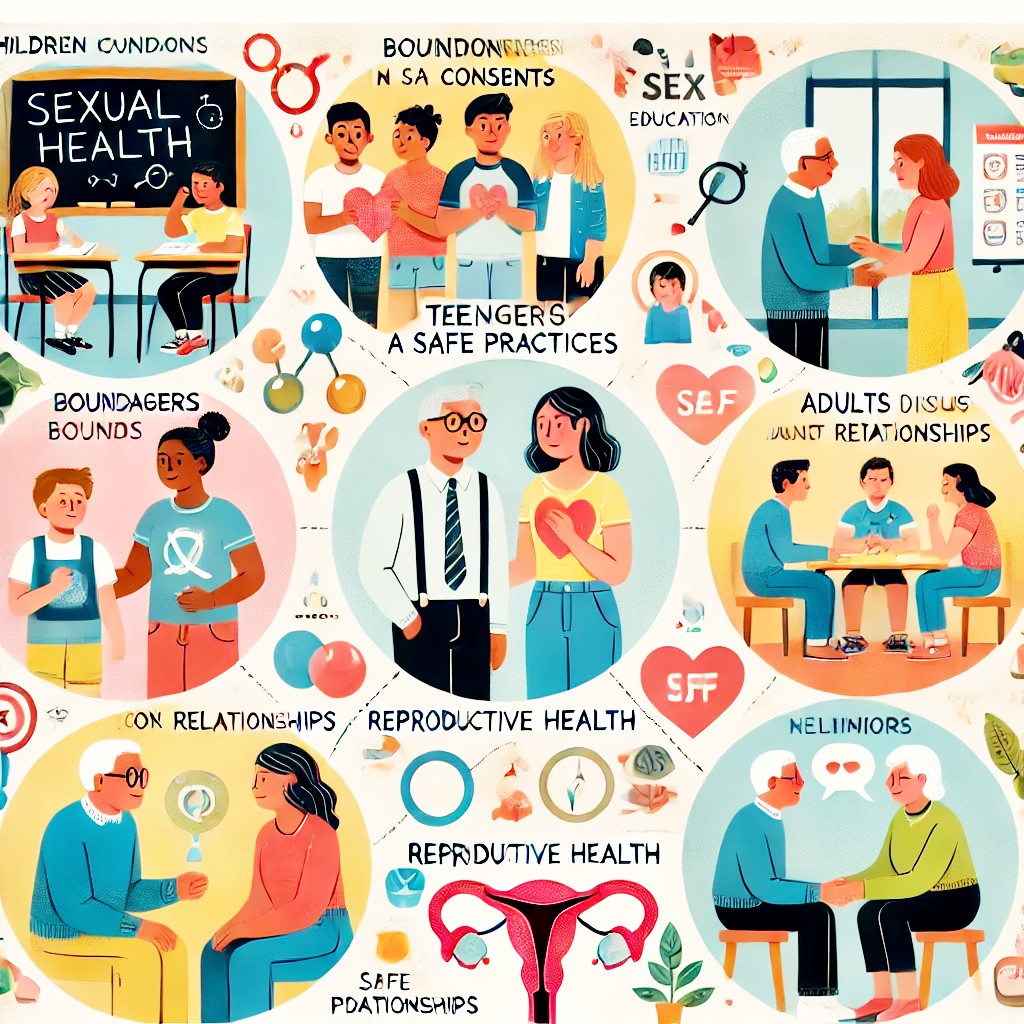
Sexual Health Through the Lifespan: key 101
key insights highlights that sexual health involves not only the prevention of disease but also maintaining emotional balance, intimacy, and a healthy relationship with oneself throughout the various stages of life. Emphasizes key knowledge and advice tailored to the unique needs of each life stage, from childhood to older adulthood. These insights aim to help individuals sustain their sexual health, addressing challenges that arise at different points in life.
Key insights for each stage include:
- Childhood and Adolescence: Understanding the physical and emotional changes of puberty, learning about consent, body autonomy, and the importance of healthy relationships.
- Young Adulthood: Focusing on preventing STIs, contraception, and fostering emotional connection and communication in relationships.
- Adulthood: Managing reproductive health, balancing work and personal life, and promoting sexual health through regular check-ups.
- Older Age: Navigating changes in sexual health, libido, intimacy, and overall well-being during aging.
These key insights support individuals in maintaining sexual health by addressing education, prevention, and the broader emotional and physical aspects of well-being at each stage.
Understanding “Normal” Sexual Health Across the Lifespan: key insights

Understanding what constitutes “normal” sexual health can greatly assist individuals in managing their sexual well-being at various stages of life. Since sexual health issues differ by age, it’s crucial to be aware of common changes and challenges that arise at different points in life. Below is a summary of typical sexual health concerns by age group, highlighting what is considered “normal” and when intervention may be necessary.
1. key insights of Childhood and Early Adolescence (Ages 0-12):
- Physical Exploration: Children often begin exploring their bodies and expressing curiosity about gender and sexual organs. This is a natural part of growing up.
- Sexual Behavior: Behaviors like playing “doctor” or asking about reproduction are typical and non-sexual. Boundaries should be set, and privacy should be taught.
- Concerns: If sexual behavior is excessive or involves inappropriate contact, it should be addressed. Teaching boundaries, privacy, and respect is crucial.
2. key insights of Adolescence (Ages 13-18):
- Puberty & Sexual Awakening: Puberty leads to physical changes, such as breast development, voice deepening, and the rise of sexual feelings and attractions.
- Exploration: Adolescents may experiment with masturbation or engage in sexual exploration with peers.
- Normal Concerns: Adolescents may question their sexual orientation, face body image insecurities, or feel peer pressure regarding sexual behavior.
- Health Concerns: STIs, contraception, and body image concerns are primary issues. Teaching safe sex practices and encouraging STI screenings are vital.
3. key insights of Young Adulthood (Ages 19-30):
- Sexual Exploration & Relationships: Many young adults begin to explore more serious sexual relationships and experience shifts in their sexual desires.
- Normal Concerns: Contraception and STI prevention remain critical concerns. Issues like erectile dysfunction or low libido might arise, particularly in new relationships.
- Health Concerns: Relationship dynamics, emotional well-being, and family planning are common areas of concern.
4. Key insights of Adulthood (Ages 31-50):
- Healthy Relationships & Sexual Function: In long-term relationships, sexual intimacy may require more effort, particularly with competing responsibilities like work and family.
- Normal Concerns: Changes in sexual function, such as reduced libido or erectile dysfunction, can happen due to lifestyle factors or stress.
- Health Concerns: Hormonal changes, mental health issues, and conditions like diabetes can impact sexual health.
5. Key insights of Older Adults (Ages 50+):
- Age-Related Changes: Menopause for women and erectile dysfunction for men can lead to physical changes that impact sexual health.
- Normal Concerns: Many older adults experience a decrease in sexual desire or function. For some, sexual intimacy may shift towards emotional connection over physical intercourse.
- Health Concerns: Chronic conditions, medications, and mental health issues can influence sexual health, and the risk of STIs may increase for older adults with multiple partners.
Key Takeaways:
- Physical Changes: Changes in sexual health are often due to aging, hormonal shifts, or health conditions.
- Communication: Open communication with partners and healthcare providers is essential for managing sexual health throughout life.
- Mental Health: Emotional well-being has a strong impact on sexual health. Addressing mental health issues can enhance sexual intimacy.
- Preventative Care: Regular screenings, discussions about contraception, and attention to sexual function can support sexual health at every age.
By understanding the key insights of what is normal and recognizing when professional help is needed, individuals can maintain sexual health as a positive and integral part of their lives.
Key insights: Sexuality in Your 20s vs. 40s: What’s Changing?

As we move from our 20s into our 40s, our sexuality shifts due to physical, emotional, and psychological factors. Here’s a breakdown of how it changes:
In Your 20s:
- Self-Discovery: This decade is marked by a period of exploring and defining sexual preferences, identities, and boundaries. Whether engaging in casual or serious relationships, people are often in discovery mode.
- Peak Physical Vitality: Many experience heightened energy and sexual desire during their 20s, resulting in more frequent sexual activity.
- Hormonal Activity: Hormones like testosterone in men and estrogen in women are at their peak, leading to strong sexual drive and arousal.
- Freedom & Flexibility: Without the pressures of long-term commitments or family planning, there’s more space to enjoy casual, less-committed sexual relationships.
In Your 40s:
- Evolving Priorities: By the time people reach their 40s, life priorities such as career, family, and personal growth can impact both desire and the frequency of sexual activity.
- Physical Shifts: Hormonal changes become more apparent, particularly in women experiencing perimenopause or menopause, which may affect libido and comfort. Men also see a gradual decline in testosterone, influencing sexual desire and performance.
- Emotional Maturity: In your 40s, emotional growth enhances sexual communication. People often focus more on emotional connection than physical attraction in their sexual relationships.
- Greater Emphasis on Quality: Individuals may prefer more meaningful sexual experiences rather than focusing on the frequency, especially within stable, long-term relationships.
Key insights of Common Themes:
- Increased Self-Awareness: As we age, we become more confident and self-accepting of our sexual identities, fostering healthier sexual relationships.
- Health Awareness: While sexual health is important at any age, individuals in their 40s tend to be more conscious of potential health issues such as STIs, erectile dysfunction, or vaginal dryness.
Although sexuality changes with age, it doesn’t diminish. Many continue to experience fulfilling sexual relationships throughout their lives, with evolving dynamics and insights.
Navigating Sexuality After Menopause: key insights

Sexuality after menopause can be a time of both challenges and fresh opportunities. As women move through this life transition, hormonal changes—primarily a drop in estrogen—can affect sexual experiences and health. Despite this, many women discover ways to embrace and celebrate their evolving sexuality. Here’s a look at some important key considerations:
1. Physical Changes
- Vaginal Dryness: A decrease in estrogen can lead to vaginal dryness, often resulting in discomfort during intercourse. The use of lubricants or vaginal moisturizers can help manage this symptom.
- Lower Libido: The hormonal decline associated with menopause may lead to a reduced sexual desire. However, libido is unique to each individual, and many women find that their sexual desires evolve, or they still feel a strong interest in intimacy.
- Altered Orgasm: Some women may notice changes in their ability to achieve orgasm after menopause, either due to physical changes or a shift in what feels satisfying sexually.
2. key of Emotional and Psychological Shifts
- Increased Confidence: Many women report a rise in self-assurance as they age, feeling more at ease with their bodies and desires, which can lead to a more authentic and enjoyable sexual life.
- Deeper Connections: For many, the focus post-menopause shifts from seeking just physical pleasure to a stronger emotional connection with their partners, which can enhance intimacy and sexual satisfaction.
- Reduced Pressure: With no need for contraception or concerns about pregnancy, many women find they can enjoy sex with less anxiety, fostering a more relaxed experience.
3. key of Communication and Relationships
- Conversations with Your Partner: Honest communication with your partner about physical comfort, emotional shifts, and evolving desires is essential for a healthy sexual relationship.
- Exploring New Dimensions of Sexuality: Menopause can be a time to try new aspects of sexuality, whether through different types of physical affection, sexual positions, or by embracing solo experiences like masturbation.
4. key of Health Considerations
- Staying Active and Bone Health: Maintaining physical activity, including exercises that strengthen the pelvic floor, can improve sexual comfort. Exercise also helps with energy and mood, positively affecting libido.
- Consulting a Healthcare Provider: Women may want to speak with a healthcare professional about changes in sexual health. Treatments like hormone replacement therapy (HRT) or non-hormonal creams can help manage issues such as vaginal dryness or reduced libido.
5. Embracing the Transition
- Reevaluating What Sexuality Means: Menopause can inspire a shift in how women view their sexuality, often discovering new pleasures and forms of intimacy that they hadn’t explored before.
- Greater Satisfaction through Self-Pleasure: Many women find greater fulfillment in self-pleasure after menopause, enjoying a deeper connection with their bodies.
Though menopause brings about physical and emotional changes in sexuality, it doesn’t mean that sexual pleasure has to fade. By embracing these changes, maintaining open communication, and being open to exploring new paths, women can continue to enjoy a satisfying sexual life well into their later years.
Key insights of Why exploring how sexual health and experiences change over time is important?
Exploring the changes in sexual health and experiences as we age is vital because it helps demystify the natural challenges people face during different phases of life. Recognizing these transitions can reduce anxiety and lead to more open, supportive discussions about sexual well-being. Here’s why this exploration is beneficial:
- Greater Awareness: By recognizing the changes that occur in sexual health over time, individuals can prepare and take steps to maintain or enhance their sexual well-being.
- Addressing Common Struggles: As people age, they may encounter issues like decreased libido or intimacy changes. Understanding these challenges as normal helps individuals feel less isolated and reassured that they are not alone.
- Empowerment Through Knowledge: Providing advice that is tailored to specific life stages—whether in your 20s, 40s, or after menopause—encourages individuals to approach their sexuality with confidence, resulting in better self-care and healthier relationships.
- Promoting Healthy Communication: Conversations about how sexuality evolves can encourage openness with partners, healthcare professionals, or close circles. This helps to foster understanding, reduce shame, and build more satisfying sexual relationships.
- Sustaining Sexual Fulfillment: By acknowledging and adapting to the changes in sexual health, people can continue to enjoy fulfilling and meaningful sexual experiences throughout their lives, prioritizing emotional closeness and connection over just physical attraction.
In summary, recognizing how sexual health evolves over time helps to normalize the natural changes that come with aging, promoting positive, healthy sexual experiences throughout each stage of life.
Recommend:
Understanding Safe Sex Practices: A Detailed Guide
The Role of Parents in Sex Education 101: How to Guide Your Child Towards Healthy Sexual Awareness
The Fundamentals of Sex Education 101: Importance, Topics, and Global Perspectives
Promoting LGBTQ+ Inclusivity: comprehensive Equality and Respect 101
Powerful pleasure & Sexual Exploration: Understanding Your Desires and Boundaries 101
Uplifting Body Positivity and Self-Love | Self-Acceptance Tips 101
https://en.wikipedia.org/wiki/Sexually_active_life_expectancy
https://en.wikipedia.org/wiki/Sexual_and_reproductive_health
